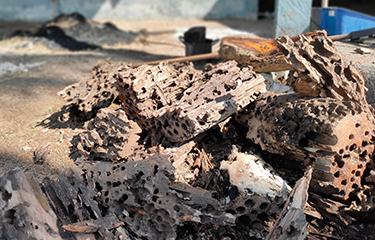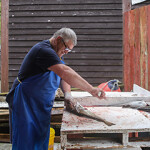Shipworms, long considered a pest, could be perfect species for sustainable aquaculture

A University of Cambridge study has found that shipworms, or naked clams – which have historically been considered by many in the seafood industry to be a nuisance due to their ability to bore through the wood of ships, piers, and docks – can be turned into a nutritious source of protein for human consumption using an enclosed aquaculture system.
The study, titled “Naked clams to open a new sector in sustainable nutritious food production,” found that shipworms are the world’s fastest-growing bivalve and contain high levels of vitamin B12. The study’s authors said using the bivalve as seafood offers a rebrand for the traditionally recognized sea pest.
“Naked clams taste like oysters; they’re highly nutritious, and they can be produced with a really low impact on the environment,” University of Cambridge Department of Zoology and Henslow Research Fellow David Willer said. “Naked clam aquaculture has never been attempted before. We’re growing them using wood that would otherwise go to a landfill or be recycled to produce food that’s high in protein and essential nutrients like vitamin B12.”
The fully enclosed aquaculture system proposed in the study offers a number of benefits. Production costs are low with the species, as they don’t require shucking, and using a modular design farmers can control the indoor environment both near and far from the sea, presenting aquaculture opportunities in multiple locales.
Though the study suggests an aquaculture model, humans around the world already consume shipworms – including in the Philippines, where locals eat them raw, battered, and fried. The study’s contributors, including Willer, think naked clams can become a popular protein option as a white meat substitute in processed foods, similar to the way consumers use fish fingers and fishcakes.
“We urgently need alternative food sources that provide the micronutrient-rich profile of meat and fish but without the environmental cost, and our system offers a sustainable solution,” University of Plymouth Marine Biology Lecturer Reuben Shipway said. “Switching from eating beef burgers to naked clam nuggets may well become a fantastic way to reduce [one’s] carbon footprint.”
Researchers are continuing to trial various waste wood and algae feed in the closed aquaculture system to optimize the growth, taste, and nutritional profile of shipworms.
The study from the universities of Cambridge and Plymouth received funding from The Fishmongers’ Company, the British Ecological Society, the Cambridge Philosophical Society, the Seale-Hayne Trust, and the Biotechnology and Biological Sciences Research Company.
Photo courtesy of Clarence Philip/Shutterstock





Share